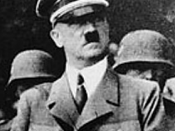Why Did Nazi Anti-Semitic Policy Develop As It Did, Between 1933-1939? Adolf Hitler came to power in 1933. Strongly influenced by "ÃÂSocial Darwinism', as a teenager, he implored anti-Semitic ideas into his governing policies. The degree of intensity of the anti-Jewish policies varied as Hitler's presidency developed. When he came to power, he realised the struggle, in an economical sense, Germany was enduring. So, with his key priority being the restoration of Germany's economy, Hitler decided not to establish any anti-Semitic policies when he came to power; and in the early stages of his ruling. In his campaigning running up to the 1933 election, he promised that the economy and unemployment levels would improve.
The first official development of the Nazi anti-Semitic policy came in the form of a boycott in the April of 1933; it was evidence of the discontent among the racist fanatics, within the ranks of the Nazi party.
These fanatics continued the persecution of Jews at a "ÃÂGrass root' level; the SA often the instigators of such schemes. The boycott was a response to the fanatics. Hitler had to appear as though he had restored law and order so he couldn't tolerate the terrorising of the Jews, despite his hatred towards them. It was an attempt to prohibit Jewish businesses and professions. The boycott lasted only one day even though it was designed to be an indefinite plan. The reason for such an abrupt halt to the boycott was due to Germany not being economically sound. Chief businesses were predominately Jewish owned, in retrospect the Nazis were very tolerable with the Jews in comparison of what was to follow.
Hitler had aspirations of consolidating his position as fuhrer. Without the support of the population whose attitudes varied towards the Jews, he was unable to be ruthless...


